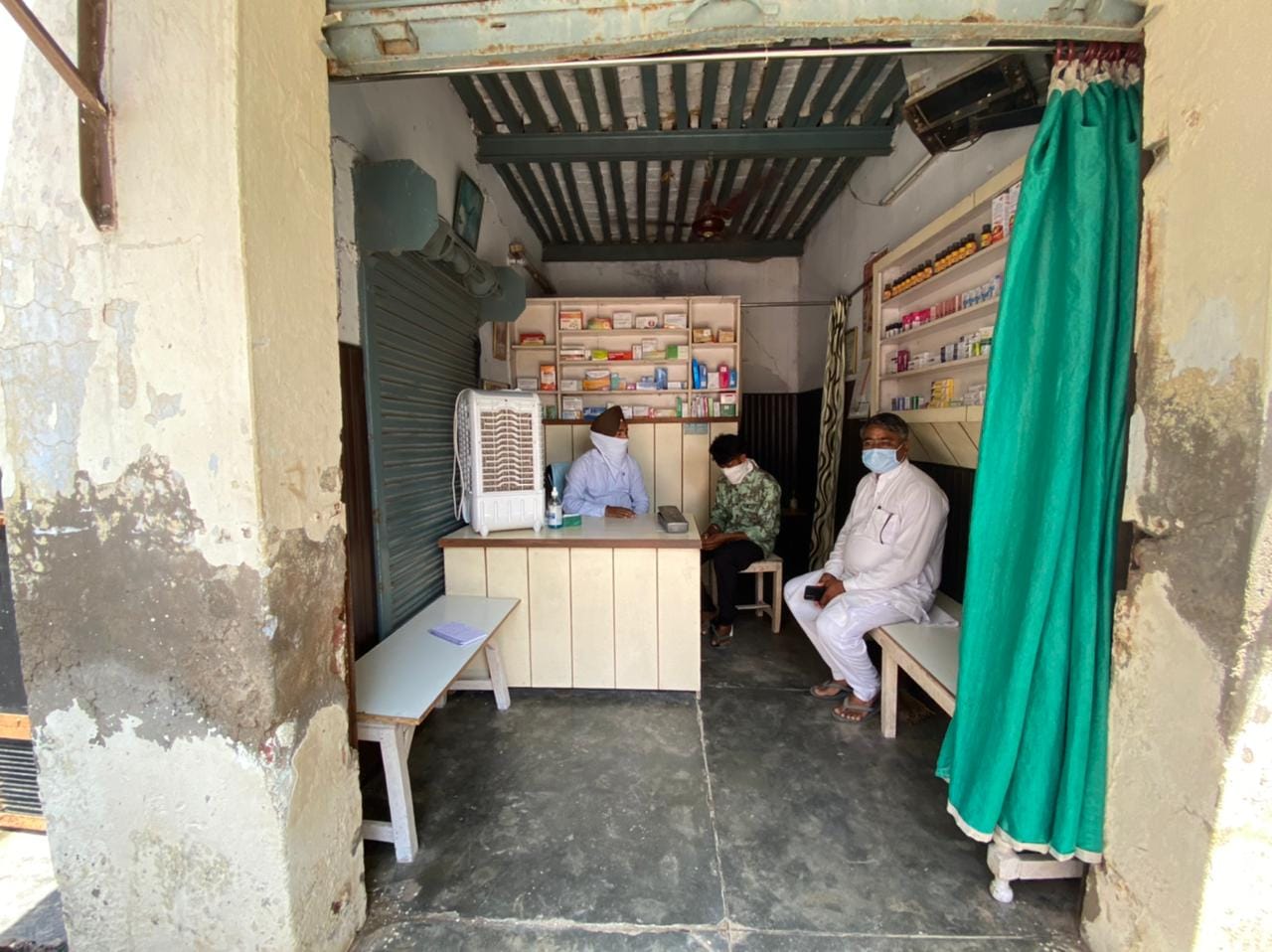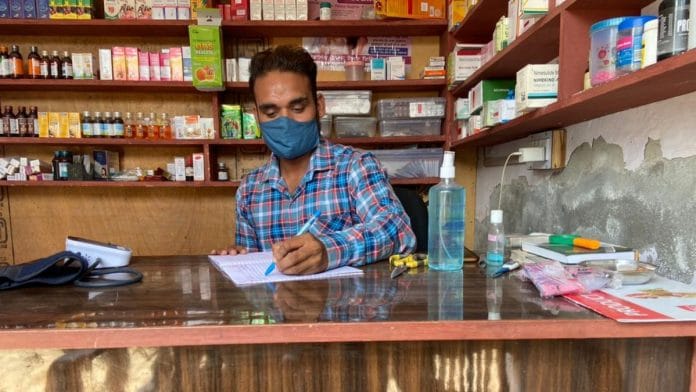Patiala: The administration in Patiala, Punjab, has come up with a distinctive strategy to identify possible Covid-19 cases in rural areas — trace people who approach local chemists for ivermectin and paracetamol, drugs advised for Covid treatment, and test them. People who approach registered medical practitioners (RMPs) — and even quacks — with Covid-like symptoms are being traced in a similar manner.
Across 1,038 villages in Patiala, the administration has instructed Accredited Social Health Activists (ASHAs) to be in touch with RMPs, quacks and chemists in their respective areas, collect real-time data on whoever approaches them with Covid-like symptoms or medicines for the same, and immediately send their details to the administration.
Once received, this data is keyed in at the central control room. The people in question are contacted and a team is then sent to test them.
This initiative, taken as part of the Mission Fateh 2.0, started by the Punjab government to check the spread of Covid-19 in rural areas, has “worked very well for the district to effectively identify, track, test and isolate people infected with the virus, further helping them contain the number of deaths”, Patiala Deputy Commissioner Kumar Amit said.
It was launched on 20 May.
According to data available with the Punjab administration, more than 11 per cent of the state’s total deaths had been reported from Patiala as of 21 May. By that date, Punjab, with the highest case fatality rate at the time, had recorded 8,963 deaths. Of these, 1,019 were reported from Patiala alone.
The new initiative has also helped bolster testing, say authorities.
Since 21 May, more than 68,233 samples have been collected from Patiala villages, as compared to a few thousand in April, officials claimed. This has helped detect more cases. As compared to 2,866 cases reported from 8 April to 7 May, the number was 3,736 between 8 May and 7 June.
A total of 170 Covid deaths have been officially reported from rural Patiala so far. However, there has been no Covid fatality from its villages in the past 15 days, according to district administration data.
Also Read: Haryana’s Chautala village sent hundreds to farm protests. Then Covid cases, deaths piled up
Bringing chemists and quacks on board
As deaths with Covid-like symptoms in rural Patiala began to rise amid the second wave, the administration started a survey and found that many chemists were selling medicines like ivermectin, paracetamol and even steroids to villagers who came to them with complaints of fever, body ache, sore throat and vomiting — all of which are Covid symptoms.
It is then that the administration felt the need to bring chemists and local doctors on board to identify suspected Covid cases, isolate them and contain the spread of infection, Amit said. A meeting with RMPs and chemists was held to brief them about the exercise.
“These doctors and chemists are the first point of contact for any village person who falls sick and that is why it was important for us to bring them on board and help us identify suspected Covid-19 cases,” Amit added.
Many villagers had died after taking unsupervised medication, he said.
“Initially, it was very difficult to identify people who may be infected. Upon falling sick, these people would usually go to these doctors or just get medicine from the chemist, thinking it is normal flu,” he added. “They ended up spreading the virus. Taking medicines without supervision also led to many deaths. We never knew if these deaths were due to Covid or otherwise, because those people never got tested,” he said.
“When we found that so many people were given medicines like ivermectin, paracetamol and even steroids by these chemists/quacks, we instructed them to not sell any medicines to any cases of suspected Covid-19 and, in fact, maintain their data and inform the authorities immediately so that those people can be tested, isolated and given proper medical care,” he added.
Also Read: 60 deaths in 40 days in tiny Titoli, 8 listed as Covid. Uncounted toll rises in rural Haryana
‘After three successive deaths, we ensured no one died here’
Gurdhyan Singh, an RMP at Bolar Kalan village, was busy updating his record of patients for the day when ThePrint spoke to him this week.

He has set aside a special notebook with a separate column for people with symptoms like fever, cough, recurring headache, body ache and even loose motions, and he updates the block authorities about suspected Covid cases in his village on a daily basis.
Initially, Singh, too, prescribed medicines to people coming to him with symptoms, not realising that he may be doing them more harm than good. However, he said he has now realised the need to flag any symptomatic case in the village.
“People used to come and tell me that they have a headache or fever and I used to give them medicines. But now, since we have been asked to maintain data of patients who come to us with Covid-like symptoms, we write down their names and addresses with contact numbers and convey this information to the administration, so that they can send a team to their homes for testing,” he said.
“We now understand why it is important and are complying with it to ensure that the virus is contained,” he added.
Even residents of the village, which has roughly 470 households, are completely on board with the initiative. According to villagers, few took Covid seriously until three successive deaths of people with symptoms of the disease in the first week of May.
While one was a man in his 30s who had just returned from the Kumbh mela in Uttarakhand, the second was a milkman who made delivery visits to the former’s house. The third death was reported just a few days later, and many people in the village started falling sick with Covid-like symptoms.
“At that time, no one was taking Covid seriously. But when three people died in quick succession and many started falling sick in every house, we realised something was wrong,” Randeep Rana, husband of the village sarpanch, told ThePrint. “Most of us went to the local doctor or took medicine from the chemist.”
“Then, one day, a team from the administration came to us, asking why we were taking these medicines. They said they took our details from local chemists. They then asked us to get tested and more than 20 people tested positive,” he added.
Dharam Pal Sharma, the Block Development and Panchayat Officer for the Sanour block, said it has become easy to trace people with Covid-like symptoms since the local RMP doctors and chemists have started keeping their data.
“Doctor sahib now shares the data of people with any symptom with the authorities and a team comes to test. The person is then isolated and given treatment on time. This has really helped curb the spread in our village,” he said. “In the last 15 days, no death has been reported from the village.”
(Edited by Sunanda Ranjan)
This report has been updated with additional information
Also Read: Delhi, ‘friends’, farmers — how Covid surged in Sonipat, peaked at positivity rate of 57%






